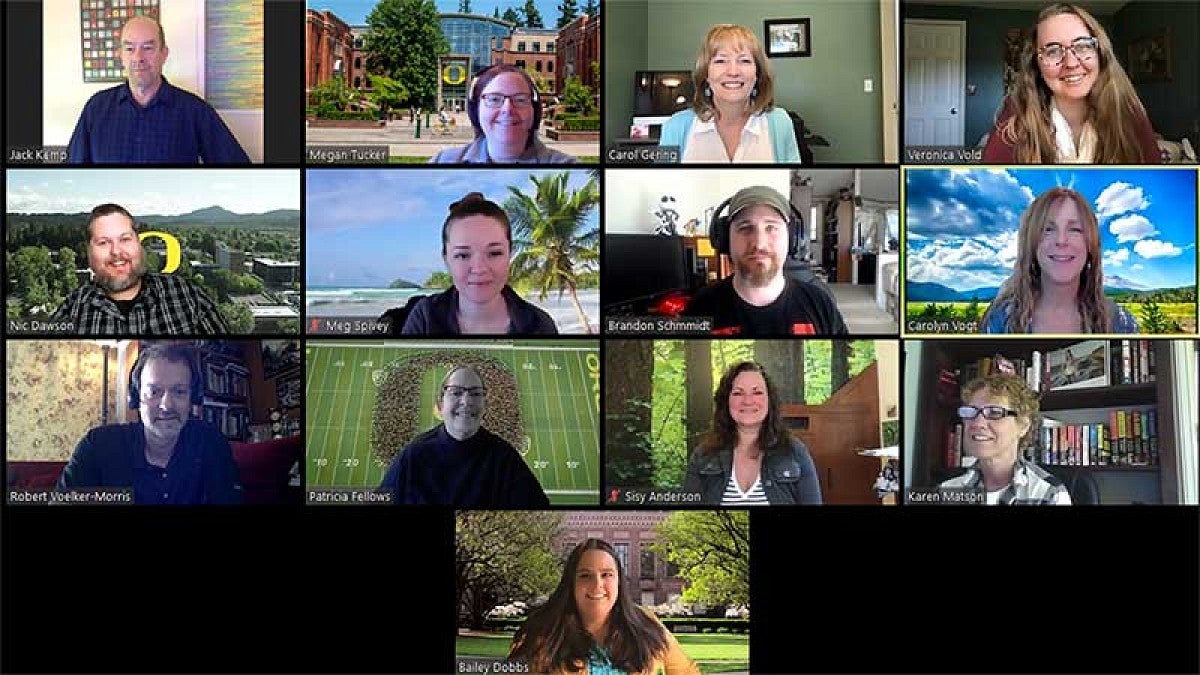Over the past several months, many faculty and staff members at the University of Oregon have used teamwork, collaboration and ingenuity to address the new challenges presented by COVID-19.
To recognize these efforts, Around the O Workplace is launching a new series, “Beyond the Call,” which will highlight UO employees who have gone above and beyond during this crisis.
When the COVID-19 crisis began, employees across the university had to rapidly shift to safeguard the campus, meet the demands of teaching and supporting students remotely, maintaining research, and partnering with public agencies to respond to the coronavirus. Much of this work happened behind the scenes and in short order to help transition the university to remote work and classes, while preparing for possible cases of COVID-19 on campus.
“The move to teaching remotely in a mere matter of weeks challenged our entire campus community like never before,” said Patrick Phillips, provost and senior vice president. “It was incredible to see so many people go above and beyond the call to creatively problem solve and innovate to support our students. Actions big and small helped to transform our university in record time.”
Today, Zoom and other videoconferencing programs are on nearly everyone’s devices. But that required contract agreements before those programs could be downloaded by students and employees.
Greg Shabram, chief procurement officer for the university and the logistics lead for UO’s Incident Management Team, led the effort to ensure the university has everything it needs to respond to COVID-19. The work came with its own set of challenges as suppliers faced product shortages, something seen nationally.
“We were able to act quickly to contract for the software and systems necessary to enable UO’s quick transition to remote learning,” Shabram said. “We’ve been able to overcome some of these shortages with creativity and foresight. In the absence of hand sanitizer, we ordered hand washing stations to be placed around campus and found alternative sources of sanitizer from local distilleries.”
Shabram and his team also worked to purchase Chromebooks that were given to students in need so they could attend their remote classes.
But the software and devices were only part of the transition to remote learning. Faculty members also had to move their entire spring curriculum in only a week while also finishing winter term classes and grading finals.
UO Online, a department in the Office of the Provost focused on the development of online courses and programs, was able assist faculty members in transitioning spring classes to remote delivery and planning class activities using only digital platforms.
“We had to in a very short timeframe go from a focused support model to being asked to support all of campus in their remote teaching,” said Robert Voelker-Morris, online education liaison for UO Online.
In collaboration with the Teaching Engagement Program, the UO Online team provided training and workshops to assist faculty members with the move to remote teaching.
“We were a fairly new team and new area of support on campus before the spring term remote situation occurred,” Voelker-Morris said.
The most recent members of UO Online started in February, less than two months before the announcement was made about a remote spring term. The entire department put together a Canvas support system incorporating previous resources and adding additional help from the online exam center, instructional designers and volunteers to assist faculty. In the first month, the team answered more than 150 support requests.
“It has been astounding how quickly we were able to come together and work as a cohesive group in a high-stress and unexpected situation,” Voelker-Morris said. “Throw in on top of this the challenge of being separated out into a remote work environment. It just has been a really rewarding and powerful experience.”
Even while many faculty and staff members are working remotely, a number of employees are still on campus to perform essential duties, including many of the staff at the University Health Center. In addition to screening everyone coming into the Health Center for COVID-19 symptoms, staff in the psychiatry department, physical therapy, and the on-site lab and radiology have been working following Oregon Health Authority guidelines.
“The University Health Center has swiftly changed our operations to respond to the COVID-19 concern,” said Debra Beck, executive director of the center. “The group of people working at UHC come to work every day ready to help our students.”
Staff members have been working together to support each other and their patients. That includes an increase in cleaning high-touch surfaces and patient rooms, the purchase of more scrubs and website updates.
“Our team has made this a true team effort,” Beck said. “We are in this together and are here for our students.”
These are only a few examples of how many UO employees are working beyond their normal responsibilities to support the campus community and university’s mission. More highlights will be published weekly and featured on the Beyond the Call webpage and weekly Workplace email.
To nominate UO employees who has gone above and beyond in their role during COVID-19, submit a nomination using the online webform.
—By Jesse Summers, University Communications


